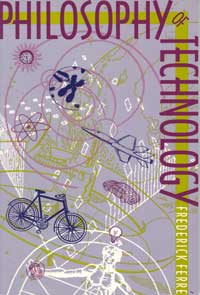
Frederick Ferré
University of Georgia Press, 1995.
This is a useful introduction to the field, as set out by these chapters:
From the outlook of this site, Chapter 5 is of particular interest, as it discusses the "sombre visions" of Heidegger and Marcuse, and the "bright visions" of Marx and Buckminster Fuller. The inclusion of Fuller is nothing less than staggering, given the usual ignorance of his contribution to technological theory and practice, and the reader will be rewarded with a consideration of excerpts from No More Secondhand God, Fuller's poetic contemplation of the meaning of technology.
Ferré defines technology as practical implemented intelligence, and argues that a technology must be "somehow concretely embodied, normally in implements or artifacts, sometimes simply in social organization" (p.26)
The implications of this definition may not suit those who prefer to include non-material tools within technology:
"it would be wise to guard against the absorption of all methods and techniques, including even wholly mental ones, into the concept of technology. A natural language, for example, is vitally important for virtually everything that happens in a culture, including (among much else) its practical achievements. But because of this near universal relevance we would stretch the concept of technology to the tearing point if we were to include natural languages within it. Similarly, mathematics undergirds practical life in innumerable ways; but although the technique of doing sums in one's head may be related to technology it should not itself be equated with technology." (p.24)
On these grounds, software appears to be excluded, but he seems to say that it can be included as it is embodied, just as a calculation can be scribbled by pen on paper. But hardware is not the embodiment of software, as far I can see. I grant that software without any hardware at all would not be of much use, but neither would the reverse situation.
Perhaps this only shows how tricky this field of enquiry can be, and the consequent need for a book like this. It is not so obvious, though, that there is a pressing need for Chapter 7, which is a theological digression which will not be of universal interest.
Ferré looks forward to a new model of science:
"In several ways the field of ecology bids fair to become the leading 'post-modern' science, since it does not share the basic metaphysical and epistemological assumptions, characteristic from the time of Galileo, of the modern thought-world." (p.132)
One of the reasons he suggests for this is that,
"ecology cannot do its scientific work without acknowledging the rich spontaneity, the purposes and values, of the living world which is its subject matter."
This reversion to talk of purpose in the natural world is no doubt in line with Ferré's emphasis on religion in the book, but dragging teleology back into biology can only cloud the issues.
© Paul Taylor 2000